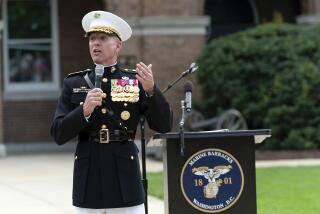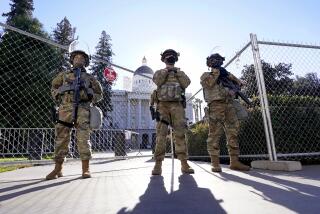2 Marine generals told to retire over breach of base in Afghanistan
WASHINGTON — Two high-ranking Marine generals were in effect fired Monday as punishment for a brazen attack last year in which Taliban fighters breached a coalition air base in southern Afghanistan, killing two Marines and destroying or damaging more than a dozen aircraft.
The commandant of the Marine Corps, Gen. James F. Amos, said Monday that he had asked Maj. Gen. Charles M. Gurganus and Maj. Gen. Gregg A. Sturdevant to retire for failing to “take adequate force protection measures” and not exercising the “level of judgment expected of general officers.”
Forcing senior generals into retirement is extremely rare. A senior officer familiar with the investigation said he believed that no generals had been sacked because of mistakes against the enemy on the battlefield since the Vietnam War, though other commanders have been ordered to retire for lesser offenses in the last decade.
Gurganus was overall commander of U.S. forces in southwestern Afghanistan when the attack occurred in September 2012 at Camp Bastion, a NATO air base that adjoins Camp Leatherneck, a vast U.S. facility. The Marines use Camp Bastion as their main air hub in the country.
During the attack, 15 insurgents disguised in U.S. Army uniforms cut through an unguarded fence line at Camp Bastion with wire cutters and made their way to the airfield. They blew up six Marine Harrier fighters worth more than $200 million and damaged eight other aircraft.
Officials described it as the largest single loss of allied materiel since the war began 12 years ago.
More than 100 U.S. and British troops took more than four hours to kill the insurgents. Lt. Col. Christopher Raible, the Harrier squadron commander, and Sgt. Bradley Atwell were killed in the battle.
A Pentagon investigation found that the insurgents slipped onto the base near an unmanned guard tower and that patrols outside the perimeter had been reduced. Gurganus’ request for more troops to defend the base had been turned down, it found.
The airfield was under British control, but Amos said that Sturdevant was responsible for assessing the risk from the enemy and for protecting his own forces. “Marines can never place complete reliance for their own safety in the hands of another force,” Amos said, explaining the decision to censure Sturdevant.
Gurganus was punished because he “bore final accountability for the lives and equipment under his charge,” Amos said.
Gurganus was nominated for promotion to lieutenant general and assigned to be chief of Marine Corps staff at the Pentagon this year. But the promotion was put on hold after Amos asked U.S. Central Command to investigate the case in May. Earlier inquiries had not examined the commanders’ responsibility.
As part of the punishment, Gurganus’ nomination will be rescinded and Sturdevant, who commanded the Marine aviation wing in southern Afghanistan, will receive a letter of censure.
In a statement, Gurganus said: “It has been an honor and a privilege to serve beside and lead Marines for over 37 years. I will treasure that forever. I have complete trust and confidence in the leadership of our Corps and fully respect the decision of our commandant.”
Gurganas was based at Camp Pendleton before deploying to Afghanistan; Sturdevant was from Miramar Marine Corps Air Station in San Diego.
Both of the Marines who were killed were from the base in Yuma, Ariz.
More to Read
Sign up for Essential California
The most important California stories and recommendations in your inbox every morning.
You may occasionally receive promotional content from the Los Angeles Times.











